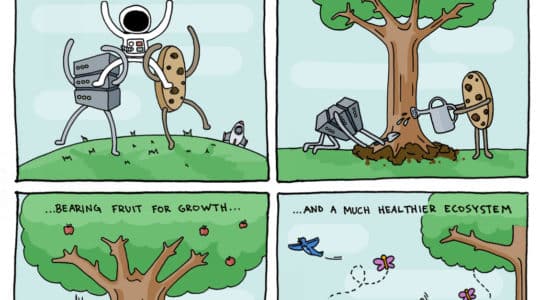
This is a guest blog post by Jonathan Kranz, the principal of Kranz Communications.
First, a confession: I’m an old-school marketer. My primary skill, writing, dates back to the Phoenicians, and I cut my teeth in direct marketing, AKA, “junk mail.”
But I do a lot of work with digital marketers through my company, Kranz Communications, and have had to salve many digital marketing wounds. Although I advise you to take the following with a terabyte of salt, I offer (based on 20+ years of experience) these recommendations regarding the skills a marketing executive or manager should demand of a digital marketer:
1. Deep understanding of your marketing automation tool
A few years ago, I asked approximately ten marketers in high-tech enterprises what their biggest marketing challenges were. Four issues consistently rose to the top; among them, an anxiety that despite the considerable power of their marketing automation platform (such as Marketo or Eloqua), the system functioned as an elaborate email engine—and little more. They found the platform complicated, and no one really understood how to apply the advanced features, such as behavioral triggers and cross-silo integration.
Using a sophisticated marketing automation platform as simply an email tool is like using a laptop as a paperweight. Your hires just have to know (or be trained to understand) what the advanced functions are and how to use them.
2. Offering “next steps” — and nothing more
About that junk mail I referenced, consider the classic letter package. On the envelope, there was a line of copy, the “teaser,” that had ONE job: get the recipient to open the letter. At the top of the letter, there was a headline, called the “Johnson Box,” that also had one job: get the reader into the body of the letter. The letter itself had one job, to get the person to submit the response device. And so on.
Notice that each step had one, and only one job—to get the customer to the next step, NOT to sell the product or service per se.
This lesson has been lost in the digital world. Today, I see campaigns in which every step, every offer, is a hard sell for what should be the last step, a purchase or a conversation with a sales person.
Stop. Your marketing hires, the people responsible for filling the content pipelines automated by your platforms, need to understand the logic of the marketing sequence and the imperative of exclusively focusing on moving prospects to the next step, whatever that next step may be.
3. Appreciate the importance of simplicity, the significance of momentum
Consider Howard Hughes and his most famous folly: the “Spruce Goose,” an airplane so large it couldn’t get off the ground (at least not for long).
Then consider the infamous content matrix, a complicated grid—much like a bingo card but a lot less fun—in which content is plotted out on the twin axes of persona (or title or role) and sales cycle stage. Such a matrix looks so smart, doesn’t it? But aside from the all false assumptions about what people want at different stages of the cycle (you don’t really know and you don’t need to—your prospects will vote with their downloads), the big issue here is weight. Complexity. And the concomitant failure to achieve liftoff.
Successful digital marketers appreciate the magic of momentum, how a simple thing done well creates its own energy that inspires enthusiasm and pulls your efforts forward. Your people should know enough to keep their matrices simple, or at least only as complicated as they absolutely need to be.
4. Turn raw data into real stories
They say that the numbers speak for themselves, but it’s rarely true. Numbers need to be interpreted; data needs to be translated. It’s what you do with the numbers, not the raw numbers, that has meaning, that “speaks.”
Your digital marketer hires must complement their hard data skills with the soft skills that give numbers meaning: the ability to leverage conflict to build tension; an appetite for understanding the buyer’s perspective and imbedding it into your content; the power to turn bare facts into compelling stories that inspire action. In an age bedazzled by digital technology, it’s important to remember that the so-called soft stuff is what distinguishes a marketer from a mathematician.
In reality, what you want from your hires will be dictated by the specific needs of your organization. But these four skills—deep automation know-how, a focus on next steps, respect for simplicity, and a capacity to tell stories—will always remain relevant regardless of context. Good luck!
Author
Becky is the Senior Content Marketing Manager at TUNE. Before TUNE, she handled content strategy and marketing communications at several tech startups in the Bay Area. Becky received her bachelor's degree in English from Wake Forest University. After a decade in San Francisco and Seattle, she has returned home to Charleston, SC, where you can find her strolling through Hampton Park with her pup and enjoying the simple things in life.




This is absolutely the 4-part skill-set for ALL marketers – not just digital marketers, in my opinion. Anyone in a hiring / managing position should ask candidates to expand upon the above and point to examples of such in their work experience.
Thanks! Perhaps the most expressly “digital marketing” point is the first one, precisely because we would expect people who call themselves digital marketers to know the digital tools. But experience tells us that this ain’t exactly so.